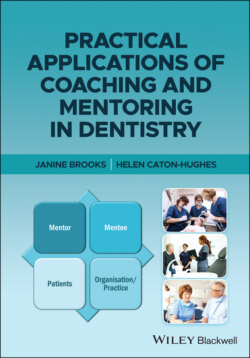Читать книгу Practical Applications of Coaching and Mentoring in Dentistry - Janine Brooks - Страница 12
Uses of Mentoring
ОглавлениеConsidering the widely varying circumstances and professional isolation of general dental practice, the most adaptable tool for supporting the quality of performance of dentists is likely to be mentoring
(Holt 2013, p. 34).
Experience since Holt wrote the above sentence has shown that the potential for mentoring goes beyond quality performance. The case study examples in Chapter 5 highlight the following areas of benefit:
Career development
Quality assurance
Improving communication
Deepening insight and self‐awareness
Excellence
Remediation of poor performance.
These are also explored further in the discussion chapter.
It's not only the dental practices that benefit from mentoring, the 2004 National Health Service (NHS) national staff survey (Healthcare Commission 2005) noted that 17% of staff identified that they had received training and development from a mentor during the previous 12 months.
The Department of Health, NHS knowledge and skills framework and development review (2004, p. 8) highlighted two key messages that relate to mentoring:
Mentoring is key to the future of the NHS.
A national framework for mentoring is to be created.
Viney and Paice (2010, p. 38) reporting on the London Deanery ‘First Five Hundred’ mentees concluded: ‘The first five hundred mentees have confirmed our conviction that this service is needed and appreciated by a significate number of doctors and dentists’.
Increasingly, as clinical leadership grows, the use of mentoring and coaching to support leadership development is also growing. Many leadership programmes for health professionals now including a blend of training, development, mentoring, and coaching, as well as training for clinical leaders in mentoring and coaching skills.
